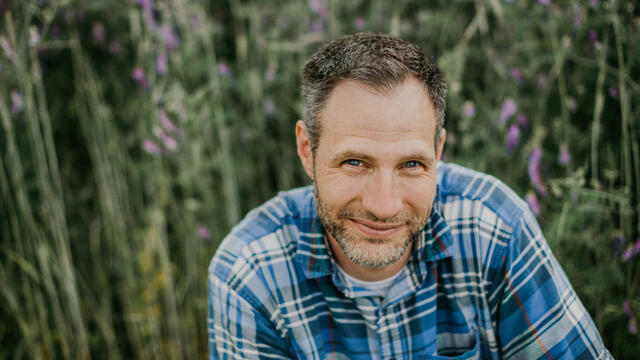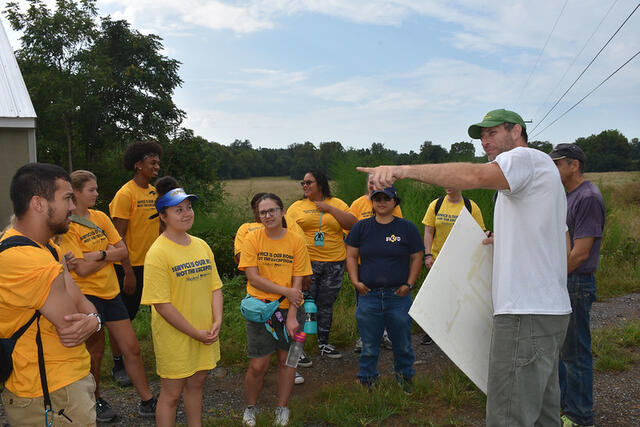Jeff Groff ’01
Jeff Groff ’01 is Professor of Physics and chair of a department at a university that doesn’t offer a degree in Physics. In fact, he embraced the opportunity to explore a new field and enrich it with his unique expertise – ultimately earning West Virginia Professor of the Year honors and making exciting innovations to the Environmental Studies program at Shepherd University.

Photo by Molly Humphreys, Piccadilly Posh Photography, Shepherdstown, West Virginia
--
Jeff Groff ‘01, a Physics major whose graduate school focus was the biophysics of neurons and muscle cells, is Professor of Physics at Shepherd University and chair of a department that offers a degree in environmental studies.
Shepherd, in fact, doesn’t offer a degree in Physics. Yet Groff, who earned his Ph.D. and M.S. at The College of William and Mary, has thrived in this area – earning the West Virginia Professor of the Year honor in 2020 and innovating the Environmental Studies curriculum. He’s created a course in using electronics to interact with environments and another on the geology, ecology, and historical significance of Yellowstone National Park.
“The Yellowstone course culminates with a field excursion to the park where the students and I seek the signs of the restless super volcano lurking under the park and experience the thrill of connecting with the wild,” he says. “For many students, the trip is their first visit to the American west and first encounter with intact wilderness.”
In his electronics course, Physical Computing, Groff’s students are learning about his project to do real time monitoring of the water quality in the stream that flows through Shepherdstown. The data collected will be posted to the web and accessible anywhere. The same class will be working on a network of humidity and temperature sensors to place throughout the aquaponics laboratory he’s helped build at Shepherd’s 158-acre Tabler farm. This will result in a 3D map of the environment in that space, identifying potential problems with the environmental controls.
In recent years, Groff’s work has centered on developing Shepherd’s Agricultural Innovation Center with colleagues and community partners alike on Tabler Farm. The work has been unconventional for professors – from trenching for irrigation, power, and internet lines to the installation of networking equipment, solar power systems, and high-tech LED grow lights.

Day of Service at Shepherd’s Agricultural Installation Center at Tabler Farm.
“The result is that we have turned an abandoned farm with no utilities and a few run-down structures into an educational asset with a high tunnel greenhouse, an apiary or bee-yard, an orchard, raised beds, solar power systems, and an aquaponics lab where fish grown in tanks provide nutrient for hydroponically grown vegetables,” says Groff, adding that all students coming through the Environmental Studies program will be doing coursework, research, and even finding recreation at the farm.
Groff is most responsible for the apiary at Tabler. This year will be his third season maintaining honey-bee colonies at the farm. Two honey-bee related research projects await students in the spring of 2021. Students will have the opportunity to study how bees build wax comb using test materials built with a 3D printer and electronically monitoring how bees control hive temperature.
In a higher ed arena where faculty tend to narrow their focus as they move up what he calls the “academic funnel,” Groff did the opposite. By nature, he’s always embraced interdisciplinary studies. It’s why he chose McDaniel with its liberal arts mission.
Although he notes a long list of transformative courses and professors at McDaniel – from physics with Bill Pagonis and Apollo Mian to philosophy with Vera Jakoby and music with David Kreider – his most memorable class was the Honors First Year Seminar, Great Works of the Western World taught by now emeriti faculty Nancy Palmer and Thomas Deveny, and reading Homer, Virgil, Dante, Cervantes, Shakespeare, and Dostoevsky.

Jeff Groff pictured with solar installation at Shepherd.
“These works may span thousands of years of human history, but their lessons on the human condition are timeless,” says Groff, who graduated from McDaniel summa cum laude and a College Scholar, with departmental honors in Physics. “If Shelley were writing today, Frankenstein’s monster might be made via genetic engineering instead of reanimated body parts, but his loathsome existence in alienation from his creator and in isolation from other humans would still haunt us.
“If Voltaire were transported from his time to ours, he would tell us to stop obsessing over political intrigues and psychologically menacing interactions on social media and to ‘cultivate our garden’ instead.”
Groff’s love of the liberal arts and interdisciplinary studies is also why he chose to teach physics at an institution that doesn’t have a Physics major in a department that offers a degree in Environmental Studies.
“It was an exciting and somewhat surprising opportunity to explore a whole new field and maybe even enrich it with my unique expertise,” he says. “Along the way I have gained an assortment of new expertise in areas such as geographic information systems, apiculture (beekeeping), and renewable energy.
“I’ve been able to contribute to exciting initiatives such as the Agricultural Innovation Center at Tabler Farm and successfully pursue opportunities such as grants for major solar energy projects at Shepherd.”
About Jeff
Career: Physics professor and chair of the Department of Environmental and Physical Sciences
Class: 2001
Major: Physics